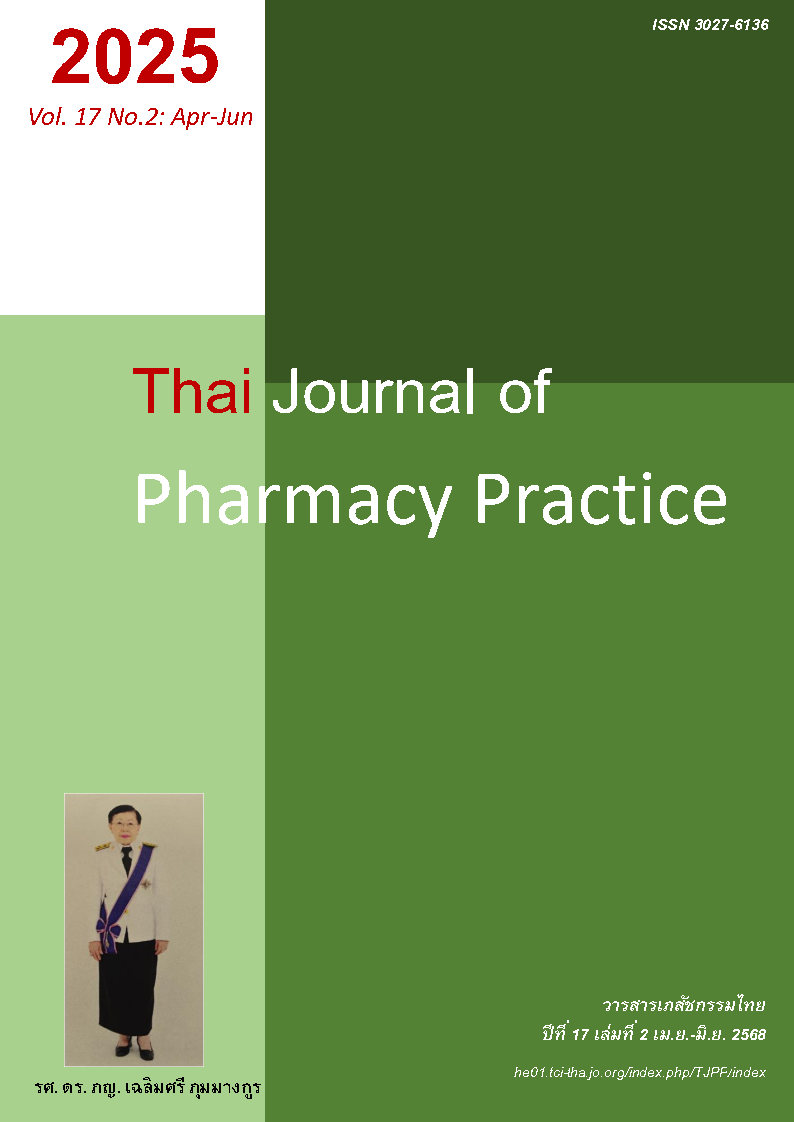Lifelong Learning of Pharmacy Students and Graduates of Mahasarakham University
Main Article Content
Abstract
Objectives: To develop a Thai version of the Lifelong Learning Attributes Questionnaire for pharmacy students and graduates and to measure lifelong learning attributes of pharmacy students and graduating pharmacy students of Mahasarakham University. Method: The researchers developed the Thai version of the Lifelong Learning Attributes Questionnaire for pharmacy students and graduates by forward translating The Jefferson Scale of Lifelong Learning-Health Professions Students Version (JeffSLL-HPS) and testing its content validity and reliability. The developed questionnaire consisted of 11 items with 3 domains including learning beliefs and motivation, attention to learning opportunities, and technical skills in seeking information. The assessment was a Likert rating scale (1 = strongly disagree, 4 = strongly agree). The 1st - 6th year pharmacy students enrolling in the second semester of academic year 2021 and pharmacy graduates in class of 2020 of Mahasarakham University completed online questionnaire during February and April 2022. Results: The developed questionnaire was evaluated for its content validity by 3 experts in pharmacy education. Its internal consistency reliability was acceptable (Cronbach’s alpha coefficient = 0.84). Participants were 560 pharmacy students from the total of 562 students (99.64%) and 63 pharmacy graduates from the total of 95 graduates (66.31%). The average lifelong learning scores of 5th and 6th year students were significantly higher than those of 1st-4th year students (P<0.001). The average lifelong learning score of pharmacy graduates was not different from that of 6th year pharmacy students. Both pharmacy students and graduates scored highest in learning beliefs and motivation and lowest in attention to learning opportunities. Conclusion: This study developed for the first time the measure for lifelong learning attributes of pharmacy students and graduates in Thai version. The results indicated lifelong learning attributes of pharmacy students and graduates that were useful for planning the development of teaching and learning or continuing education to encourage learners to have lifelong learning skill. Long-term monitoring of lifelong learning attributes is warranted.
Article Details

This work is licensed under a Creative Commons Attribution-NonCommercial-NoDerivatives 4.0 International License.
ผลการวิจัยและความคิดเห็นที่ปรากฏในบทความถือเป็นความคิดเห็นและอยู่ในความรับผิดชอบของผู้นิพนธ์ มิใช่ความเห็นหรือความรับผิดชอบของกองบรรณาธิการ หรือคณะเภสัชศาสตร์ มหาวิทยาลัยสงขลานครินทร์ ทั้งนี้ไม่รวมความผิดพลาดอันเกิดจากการพิมพ์ บทความที่ได้รับการเผยแพร่โดยวารสารเภสัชกรรมไทยถือเป็นสิทธิ์ของวารสารฯ
References
Chaiya S. The developing lifelong learning skills of students in the 21st Century. Srinakharinwirot Academic Journal of Education 2019; 20: 168-80.
Babenko O, Koppula S, Daniels L, Nadon L, Daniels V. Lifelong learning along the education and career continuum: meta-analysis of studies in health professions. J Adv Med Educ Prof 2017; 5: 157–63.
Suwannaprom P, Suttajit S, Eakanunkul S, Supapaan T, Kessomboon N, Udomaksorn K, et al. Develop- ment of pharmacy competency framework for the changing demands of Thailand’s pharmaceutical and health services. Pharm Pract 2020; 18: 2141. doi:10. 18549/PharmPract.2020.4.2141.
Novak M, Palladino C, Ange B, Richardson D. Jefferson Scale of Lifelong Learning-Health Professions Students Version (JeffSLL-HPS): an instrument to measure health professions students' orientation toward lifelong learning [online]. 2014 [cited Oct 10, 2021]. Available from: doi.org/10.1576 6/mep_2374-8265.9671
Li H, Wang Z, Jiang N, Liu Y, Wen D. Lifelong learning of Chinese rural physicians: preliminary psychometrics and influencing factors. BMC Med Educ 2015; 15: 192. doi:10.1186/s12909-015-0460-9.
Mi M, Riley-Doucet C. Health professions students’ lifelong learning orientation: associations with information skills and self-efficacy. Evid Based Libr Inf Pract 2016; 11: 121–35.
Pongsathonviboon K. Development of life-long learning assessment form for students of the Kuea Karun Faculty of Nursing, Bangkok Metropolis University. Thai Journal of Nursing Council 2013; 28: 43-54.
Meehanpong P, Chatdokmaiprai K. Assessing quality research instrument in nursing research. Journal of the Royal Thai Army Nurses 2018; 19: 9-15.
Tavakol M, Dennick R. Making sense of Cronbach’s alpha. Int J Med Educ 2011; 2: 53-5.
Maneesriwongkul W, Dixon JK. Instrument transla- tion process: a method review. J Adv Nurs 2004; 48: 175-86.
Berdie DR, Anderson JF, Niebuhr MA. Question- naires: design and use. 2nd ed. New Jersey: Scarecrow Press; 1986.
Hirunchunha S, Bunkong S, Phumdoung S, Boon- young N, Sangchan H. Lifelong learning competency of nursing students, supporting and obstacle factors related to lifelong learning competency development. Songklanagarind Journal of Nursing 2021; 41: 38-49.
Suwannoi P. Research-based learning manage- ment: development towards a research university. KKU Journal of Education 2006; 29: 16-26.


